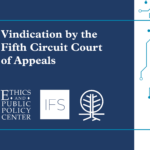
Published August 19, 2022
When it comes to technology, are Christian parents embracing the ways of the culture at the expense of their own children? Are we allowing our children to be on social media or smartphones because everyone else’s kids are on them, too?
God has put parents over children as good and loving authorities. God has also calls parents to actively disciple our children. Deuteronomy 6:6-9 instructs us to teach God’s words to our children, to “talk of them when you sit in your house, and when you walk by the way, and when you lie down, and when you rise.” Today’s social media apps and smartphones undermine both of those primary callings.
Most parents recognize the need to limit kids’ screen time. However, time limits are insufficient to protect kids from the many dangerous influencers on today’s apps. The reality is that social media feeds are not just filled with content from the peers of our children. Social media algorithms actively promote content from complete strangers. Ironically, “social” media is no longer grounded in real-life social relationships.
Kids are following and listening to strangers, many of them adults, whose voices find them and then bombard them on social media. Some of the loudest voices are transgender influencers. (Abigail Shrier’s Irreversible Damage documents this well.) LGBTQ+ activists have taken to the online world to recruit youth to join their cause and convince their impressionable minds of the normalcy of their unbiblical lifestyles and ideologies.
Other strangers sell their lives, products, diets, and advice to our children, often without the flamboyant obviousness of the transgender activists. These strangers are actively working to undermine the authority of the home and replace the loving influence of parents with their own.
As social media substitutes distant relationships for close ones, it replaces the wisdom of parents with the world’s advice. Kids struggling with anxiety or wrestling with big life questions used to only have the option of turning to their parents down the hallway. Now they turn to internet voices or to Google. The online world is supplanting the wisdom of parents and instruction from God’s Word with echo chambers of teens with limited perspectives (or worse, with the enticements of older adults to follow and join their worldly way of life).
Social media is discipling our children in the world’s standards of beauty, definitions of sexuality and gender, and lifestyles centered on self and pleasure and teaching them to live according to the flesh, which we know only ends in death.
Taking seriously the callings God has given us as parents will mean going against the culture when it comes to our children’s use of technology, especially social media and smartphones.
Parents should aim to keep their children off social media platforms until they are 18 or at least 16. It is best to delay social media as long as possible.
Swapping out smartphones for a safer, alternative phone for your child is another important and effective step parents can take today. There are plenty of alternative phone options parents can use to stay in touch with their child that lacks unfettered access to the internet or other apps.
And be proactive in having conversations early and often with your children about the proper uses of technology and potential dangers online. Each conversation is a repetition of the message, letting them know they can talk to you about anything they see.
Parents must also set boundaries around technology use in the home, such as only allowing internet use in a common, public space in the house. Don’t let children use any devices in bedrooms, especially not at night.
Our children are also watching and learning from us, so as parents, we must model a good and healthy use of technology. We can’t obey the calling of Deuteronomy 6 if we aren’t sitting with our kids, or walking with them, but are distracted by our own phones.
Finally, parents should use practical tools, like filters or parental control software, for all family internet devices. Several good options available at minimal cost are effective for blocking sexual and violent content from children’s view. However, be aware that filters will not catch all inappropriate material—it won’t block out LGBTQ+ content unless it is defined as pornographic.
For more ideas on what you can do as a parent and the tools available, see the Ethics and Public Policy Center’s new Technology Guide for Parents.
Most of these measures will be contrary to our culture. But that is the call of the Christian parent in today’s digital age, where social media are undermining our godly authority and discipleship. Don’t surrender your most fundamental role by being too passive and permissive on your kids’ use of technology.
Clare Morell is a Policy Analyst at the Ethics and Public Policy Center, where she works on EPPC’s Technology and Human Flourishing Project. Prior to joining EPPC, Ms. Morell worked in both the White House Counsel’s Office and the Department of Justice, as well as in the private and non-profit sectors.
Photo by Julia Coimbra on Unsplash
Clare Morell is a Senior Policy Analyst at the Ethics and Public Policy Center, where she directs EPPC’s Technology and Human Flourishing Project. Prior to joining EPPC, Ms. Morell worked in both the White House Counsel’s Office and the Department of Justice, as well as in the private and non-profit sectors.












